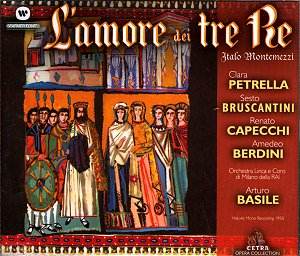An opera which has been described as ‘without a doubt
the greatest Italian tragic opera since Otello, L’amore dei
tre Re has never quite come up to expectations. Toscanini admired
it. He and Gatti-Casazza took it to the Met and its success has endured
in America more than Europe. Here it gets the sort of Wexford airing
of a curiosity but it is an opera well worth more than that (unlike
three others he produced thereafter, which were La nave, 1918,
La notte di Zoraima, 1931, and L’incantesimo, 1943). Benelli’s
libretto is a good one, the music is attractive so all the ingredients
were there for its successful première at La Scala, Milan on
10 April 1913. The plot is full of Cav and Pag verismo
melodrama, set in the Middle Ages, absent baritone husband, adulterous
soprano wife with young tenor lover, vengeful blind bass father frustrated
by suspicions of a daughter-in-law he can’t see, so he strangles her
(unusually in the second act leaving us with no heroine for the third).
Rather stupidly (though understandable seeing he can’t see … if you
see what I mean) he sprinkles the corpse’s lips with poison in an attempt
to catch the lover, rightly assuming that the lover will kiss her. Sure
enough the tenor does, but unfortunately so too does his son, now returned
from another rape and pillage session, so by the end the stage is littered,
Hamlet-style, with various corpses of all the principal singers, save
old blind Baron Archibaldo.
As far as Montemezzi’s style is concerned, there are
plenty of signs of the influence of Wagner’s Tristan, which duly
appear in the glorious second act lovers’ duet. Debussy’s Pelléas
et Mélisande is to be heard in much of the impressionism
and symbolism which permeates the opera musically and dramatically.
Both Debussy and Wagner cast their shadows over Montemezzi’s orchestration.
Although it tends to be rather dense, overriding it all is an instantly
recognisable Italianate vocal line which follows in the line of Verdi
and Puccini, with much similarity to both Mascagni and Leoncavallo.
This is a mono recording by Italian Radio fifty years
ago, the composer still with two years to live, and a transfer from
discs of the time. Though it gets off to a shaky start as far as the
sound is concerned, and the timpanist never shakes off that dull sound
as if someone is firing off a mortar shell in a nearby battle, you soon
get used to it, and by Fiora’s death the drama completely takes you
over. Despite very creditable singing from Petrella and Berdini as the
young lovers and Capecchi’s struggle with the thankless role of Manfredo,
which really only develops in the third act because he never stays around
long enough in the first two, the star of this recording is the (30
year-old) Sesto Bruscantini as the old blind baron. His performance
is dramatically chilling and vocally authoritative if rather old-fashioned
sounding. You are helped to lashings of fast vibrato (but you get used
to it) and Bruscantini is helped by always having the last (solo) word
in each of the three acts. Conductor Basile whips up his radio orchestra
to the required frenzy when necessary, the chorus (only in act three)
supply the required grief at the sight of so many dead bodies. Buy it
for Bruscantini’s performance alone.
Christopher Fifield

![]() Archibaldo - Sesto Bruscantini
(bass)
Archibaldo - Sesto Bruscantini
(bass) ![]() WARNER FONIT (2 CDs)
8573 874787 - 2 [85.49] superbudget
WARNER FONIT (2 CDs)
8573 874787 - 2 [85.49] superbudget